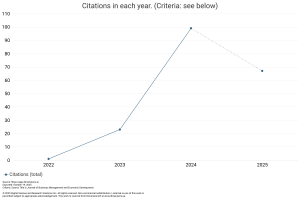Exploration of Community Empowerment in Koanara Village as the Entrance to the Kelimutu National Park
DOI:
https://doi.org/10.59653/jbmed.v1i02.146Keywords:
Empowerment, Sustainable Tourism, Tourism VillageAbstract
community empowerment is an effort to develop self-sufficiency and community welfare by increasing knowledge, attitudes, skills, behavior, abilities, awareness, and utilizing existing resources through the establishment of policies, programs, activities, and assistance that are in accordance with the root of the problem. The purpose of this research is to explore community empowerment activities in supporting villages of the Kelimutu National Park, especially Koanara village as the entrance to the Kelimutu National Park (TNK). In order to obtain comprehensive data, a case study approach was used with data collection techniques of interviews, observation and documentation. The data analysis technique used is descriptive qualitative. Data analysis is done by organizing the data, describing it in units, synthesizing it, compiling it into patterns, choosing which ones are important and what will be studied, and making conclusions. The research results found that there were several empowerment activities in KNP supporting villages, especially Koanara villages such as The Mandiri Tourism in the National Community Empowerment Program (PNPM) received a positive response from the community. Apart from that, there are also several local community empowerment activities that have arisen from local and village government initiatives as well as by the Koanara village community itself, such as establising of tourism awareness groups: The Moni Kelimutu Tourism Association (P3MK) gave birth to actors in lodging businesses, transportation services, restaurants, cafes and art galleries; village-owned enterprise (BUMDES) Hapo Kalo Koanara Village empowers village communities in agriculture and agro-tourism; and BUMDES with Kelimutu. Bumdes Kelimutu belongs to 9 villages in the Kelimutu sub-district. There are 3 business units that are formed, namely the Coming Business Unit, the Tourism Unit and the Savings and Loans Unit.
Downloads
References
Alavin Y. So, Suwarsono. 2000. Social Change and Development, Lp3s, Jakarta.
Anthony Giddens, 2001, Runaway World (How Globalization Has Changed Our Lives) Pg; 10
Arikunto, Suharsimi, 1998. "Research Procedures; Something Practice Approach”. Jakarta: Rinekacipta.
Ash'ari, Imam Sapari. 1993. Sociology of Surabaya City and Village: National Business.
Kelimutu National Park Agency (Btnk), 2013. Statistical Data of Kelimutu National Park, Ende-Flores, East Nusa Tenggara. Ntt: Balai Mr.
Damanik, Janianton and Helmut F. Weber. 2006. Ecotourism Planning. From Theory To Application. UGM Center for Tourism Studies (Puspar) and Andi Press. Yogyakarta.
Dewi, MHU (2013). Tourism Village Development Based on Local Community Participation in the Jatiluwih Tourism Village, Tabanan, Bali. Kawistara Journal, 3(2).
Fandeli, Chafid and Muhammad Nurdin. 2005. Development of Conservation-Based Ecotourism in National Parks. Ugm Faculty of Forestry, Ugm Tourism Study Center, and the Office of the Ministry of Environment. Yogyakarta.
Isnaini. 2007. Community-Based Tourism Development Model in the City of Yogyakarta. Yogyakarta City Bapeda Research. Pg 7-3.
Koswara, Agus. 2011. Material on the Concept of a Tourism Village. Garut Regency.
Lewis, J. 2003. Design Issues. In Qualitative Research Practice: A Guide For Social Science Student Researcher (Eds.) Jane Ritchie And Janes Lewis. London: Sage Publications
Martono, Nana. 2011. Sociology of Social Change. Jakarta: Rajawali Press.
Moleong, Lexy, 2002. "Qualitative Research Methodology". Bandung: Pt. Youth Rosda Karya.
Nazir, Moh, 2003. "Research Method". Jakarta: Ghalia Indonesia.
Nistyantara, LA (2011). Kelimutu National Park Management Strategy Through Co-Management Approach [Thesis]. Bogor: Graduate School, Bogor Agricultural Institute.
Nugraha, YE (2019). Market Analysis of International Tourists Using Medical Tourism Services in Bali. Tourism-Journal of Tourism, 2(2), 90-99.
Nugraha, YE, Paturusi, SA, & Wijaya, NMS (2019). Quality of Medical Tourism Services Affecting Satisfaction and Loyalty of International Tourists in Bali. Journal of the Master of Tourism (Jumpa), 348-370.
Rangkuti F. 2006. Swot Analysis Techniques for Dissecting Business Cases (Reorientation of the Concept of Strategic Planning to Face the 21st Century). Pt. Main Library Gramedia. Jakarta.
Ritzer. George. 2012. Sociological Theory (From Classical Sociology to the End of Modern Development). Yogyakarta: Student Libraries
Soekanto, Soejono. 2001. Sociology An Introduction. Jakarta : Pt. King of Grafindo Persada.
Suansri, P. (2003). Community Based Tourism Handbook. Bangkok: Responsible Ecological Social Tour-Rest.
Sugiyono. 2015. Management Research Methods: Quantitative Approach, Qualitative, Combination (Mix Methods), Action Research, Evaluation Research. Bandung: Alphabet.
Suharto, Eddie. 2010. Building Communities Empowering Communities “Strategic Study of Social Welfare Development and Social Work. Bandung: Refika Aditama.
Sunarjaya, IG, Par, S., Par, M., Nugraha, YE, Kesos, S., & Par, M. (2019, March). Analysis of Employee Empowerment Perceptions of Employee Turnover Intention at Dewi Sinta Hotel. In Journey (Journal Of Tourismpreneurship, Culinary, Hospitality, Convention And Event Management) (Vol. 1, No. 1, Pp. 182-206).
Sutiyono. 2008. Empowerment of Village Communities in the Implementation of Tourism Village Programs in the Special Region of Yogyakarta.
Tony, Fredian. 2006. Community Development (Community Development). Bogor Agricultural Institute.
Wibhawa, Budhi, Santoso T Raharjo, and Meilany Budiarti S. 2010 Fundamentals of Social Work Introduction to the Social Work Profession. Bandung: Widya Padjadjaran.
Downloads
Published
How to Cite
Issue
Section
License
Copyright (c) 2023 Marianus Saldanah Neno, Lasarus Jehamat, Yosep Emanuel Jelahut, Dominikus Kopong Toni Aman

This work is licensed under a Creative Commons Attribution-ShareAlike 4.0 International License.
Authors who publish with this journal agree to the following terms:
- Authors retain copyright and grant the journal right of first publication with the work simultaneously licensed under a Creative Commons Attribution-ShareAlike that allows others to share the work with an acknowledgement of the work's authorship and initial publication in this journal.
- Authors are able to enter into separate, additional contractual arrangements for the non-exclusive distribution of the journal's published version of the work (e.g., post it to an institutional repository or publish it in a book), with an acknowledgement of its initial publication in this journal.
- Authors are permitted and encouraged to post their work online (e.g., in institutional repositories or on their website) prior to and during the submission process, as it can lead to productive exchanges, as well as earlier and greater citation of published work (See The Effect of Open Access).





























